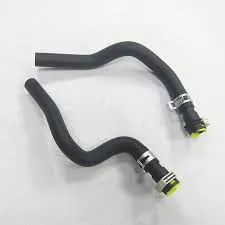oil fuel line
Nov . 25, 2024 12:37 Back to list
oil fuel line
Understanding Oil Fuel Lines Importance and Maintenance
Oil fuel lines are essential components in various applications, including residential heating systems, commercial establishments, and industrial machinery. These lines are responsible for transporting liquid fuel, typically heating oil or diesel, from the storage tank to the system's burner. The efficiency and safety of any heating system significantly depend on the condition and functionality of oil fuel lines.
The Structure of Oil Fuel Lines
Oil fuel lines are usually made of durable materials such as copper, steel, or reinforced rubber, designed to withstand high temperatures and pressure variations. The lines are often insulated to prevent heat loss, which can enhance efficiency. The design and installation must comply with safety standards to minimize risks like leaks, which can lead to fire hazards or environmental contamination.
The design of oil fuel lines includes specific bends and fitting joints to ensure a smooth flow of fuel without causing turbulence that could lead to pump cavitation or other issues. Typically, these lines connect the fuel tank, filter, pump, and burner. Understanding the layout of these components is crucial for effective maintenance and troubleshooting.
Importance of Regular Maintenance
Maintaining oil fuel lines is vital for several reasons
1. Safety Leaks from damaged lines can pose serious risks, including fire hazards and environmental contamination. Regular inspection helps in identifying wear and tear or weak points that may lead to leaks.
2. Efficiency Any blockage or damage in the fuel lines can affect the combustion efficiency of the heating system. This can lead to increased fuel consumption and higher operational costs. Regular maintenance ensures optimal flow rates and efficient fuel usage.
3. Longevity Routine maintenance not only identifies problems early but also prolongs the life of the entire heating system. By addressing issues with the fuel lines and other components, homeowners can avoid costly replacement or repair scenarios down the road.
Common Issues with Oil Fuel Lines
Several issues can affect oil fuel lines over time, including
- Corrosion When moisture enters the lines, it can lead to corrosion, primarily in metal lines. Corroded lines can weaken and become susceptible to leaks.
oil fuel line

- Cracks and Wear Rubber fuel lines can develop cracks due to age, heat exposure, or constant flexing. Even minor cracks can lead to significant issues.
- Blockages Dirt, sludge, or other debris can clog fuel lines and filters, leading to poor performance or system shutdown.
- Poor Installation Incorrectly positioned lines or improper fittings can lead to stress points, increasing the risk of leaks and failures.
Best Practices for Maintenance
To ensure the longevity and safety of oil fuel lines, a few best practices should be followed
1. Regular Inspections Homeowners and operators should routinely inspect the lines for signs of wear, leaks, and corrosion. Early detection can prevent larger issues from developing.
2. Professional Servicing It’s advisable to have qualified technicians service your heating system at least annually. Professionals can identify more subtle issues that a layperson might miss.
3. Proper Storage Ensure that the fuel tank is maintained in proper working order. A well-maintained tank prevents water and debris from contaminating the fuel, thus protecting the lines.
4. Replacing Old Lines If the fuel lines are aged or show significant signs of wear, it’s best to replace them proactively before a failure occurs.
5. Use Quality Fuels Lower quality fuels may contain contaminants that can damage fuel lines over time. Using high-quality fuels can extend the life of the lines and the overall system.
Conclusion
Oil fuel lines are a critical part of heating systems that require attention and maintenance to ensure safety and efficiency. By understanding the importance of these components and adhering to maintenance guidelines, homeowners and operators can ensure that their heating systems function optimally and safely for years to come. Awareness, regular checks, and timely repairs are the keys to avoiding costly consequences and ensuring that your oil-based heating system remains reliable.
